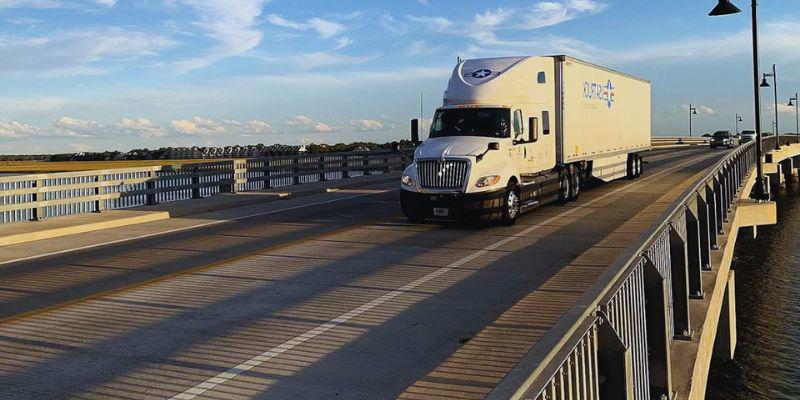
Starting June 1st, 2023 Our warehouse fee will be $0.65/cubic foot per month
In effort to lower the warehouse storage fee during inflation, we have went narrow aisle racking.This construction took us four months but the project is finally completed. With narrow aisle racking, we are able to drop storage by 24%.We as partners will go through this inflation together.
03/11/2024
WASHINGTON — The proposed legislation advocating increased flexibility for states to waive truck weight limits in emergencies is also drawing attention for granting state authorities expansive new powers to elevate weight restrictions across various freight categories, warns an advocacy group opposing overweight trucks.

Dubbed the Modernizing Operations for Vehicles in Emergencies (MOVE) Act, the bill was introduced last month by U.S. Representatives Dusty Johnson (R-S.D.) and Jim Costa (D-Calif.). The lawmakers argue that the legislation aims to "remove unnecessary roadblocks and red tape" to prevent supply chain disruptions, mirroring challenges experienced during and after the pandemic. Both sponsors represent agribusiness shippers.
In times of crisis and amidst the ongoing pandemic, Representative Costa, representing parts of California’s San Joaquin Valley, highlighted the severe impact of supply chain disruptions on struggling communities in his district. Costa emphasized the significance of bipartisan legislation aimed at eliminating obstacles hindering the timely delivery of crucial relief during critical times.
According to sources obtained by worldcraftlogistics.com, The MOVE Act, as outlined in the bill, broadens the conditions under which the federal government can authorize a state to waive federal weight limits on interstate highways for loads that are easily disassembled or divisible. These conditions now encompass not only natural emergencies such as those caused by weather, diseases, and wildfires but also extend to scenarios where the state's supply chains face significant impairments. This includes instances of slow overall movement, freight traffic congestion, or any other factors affecting the smooth flow of essential goods, as articulated in the language of the legislation.
Proposed legislation seeks to extend waivers to a 270-day duration, surpassing the current 120-day cap, enabling states to further prolong these waivers for an additional 90 days. The MOVE Act, endorsed not only by the American Trucking Associations but also by the Shippers Coalition, comprising agribusinesses, aggregates, beverage companies, and other entities handling substantial cargo, particularly benefiting from augmented weight limits.
Shippers Coalition Executive Director Sean Joyce emphasizes the MOVE Act's significance, stating, "It is a necessary step forward in ensuring that Shippers Coalition’s members can promptly and efficiently respond in times of crisis." Joyce underscores that the legislation's broadened definition of an emergency guarantees continuous access to essential goods for Americans nationwide during times of need.

The MOVE Act, intended to provide states with greater authority to adjust truck weight limits, is facing opposition from the Coalition Against Bigger Trucks (CABT). This group, staunchly against relaxing truck weight limit requirements, expresses apprehensions that the MOVE Act could pave the way for increased weight restrictions at the state level, potentially leading to a surge in crash rates.
CABT cites a 2016 U.S. Department of Transportation report that underscores the correlation between heavier trucks and elevated crash rates, especially when compared to 80,000-pound, single-trailer trucks.
Brad Roseberry, President of CABT, conveyed concerns, stating, “State governors would have unilateral authority beyond emergencies and natural disasters to arbitrarily increase truck weights based on undefined definitions of supply chain disruptions or freight congestion,” in an interview with senior experts.
Roseberry emphasized the perpetual nature of the issue, noting, “There’s nothing prohibiting a state to reissue another permit when the initial one expires, so this could go on forever. It’s basically a blank check for states to raise truck weights — that’s huge.”
Owner-operators voice safety concerns as they resist initiatives to elevate truck weight limits.
"I've transported goods for relief efforts previously, and if it's exclusively for emergency relief, that's acceptable," stated Lee Schmitt, spokesperson for CDL Drivers Unlimited, a truck driver advocacy group.
"However, broadening the scope to potentially permit anyone with a trailer to carry heavier loads in possibly ill-equipped equipment raises safety concerns. Handling heavier loads demands increased starting and stopping distances, and a lack of experience with this poses a safety risk on the roads for everyone."
Various proposals aiming to ease truck weight restrictions are currently under consideration in Congress. These include a voluntary pilot program that would empower states to elevate truck weights on federal interstates from 80,000 pounds to up to 91,000 pounds on six axles. Additionally, there is a proposal suggesting weight increases to 88,000 pounds for specific auto haulers.

Below are news articles you may be interested in:
👉 Dock to stock meaning and 10 ideas to improve effective DTS processes
👉 Wall Street's Return to Containership Lines: ZIM in the Spotlight
👉 Positive developments in US-Mexico cross-border trade and transportation
NOTE: Recently, we shared a lot of useful information about the MOVE Act. We re-edited this article based on FreightWave news. If you have comments or special requests, please contact WCL immediately.
SEO
Digital Marketing/SEO Specialist
Simon Mang is an SEO and Digital Marketing expert at Wordcraft Logistics. With many years of experience in the field of digital marketing, he has shaped and built strategies to effectively promote Wordcraft Logistics' online presence. With a deep understanding of the logistics industry, I have shared more than 500 specialized articles on many different topics.

Hot News
08/05/2024

Hot News
02/23/2023

Hot News
02/23/2023

Hot News
02/06/2023
Hot News
02/07/2023